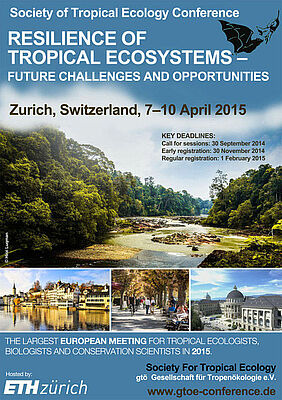From April 7 – 10, 2015, the Annual Conference of the Society for Tropical Ecology (GTÖ) was held at the Swiss Federal Institute of Technology ETH in Zurich, Switzerland. Gurbir S. Bhullar and Christian Andres from the Department of International Cooperation at FiBL chaired the session entitled "The future of tropical agroecosystems: approaches for (ecological) intensification in the South." The session held at AudiMax (the largest auditorium at ETH) included a total of 15 high-quality speeches on various topics around tropical agroecosystems delivered by speakers from many different countries. "The various case studies presented provide an excellent basis to critically assess the most suitable approaches for intensifying tropical agroecosystems in the future," says Christian Andres. A synthesis of the session in the form of a short communication will be published in various channels soon.
Systems approaches are preferable to large-scale conventional cultivation because they take into account the multiple interactions and trade-offs between the individual parts of systems and build on the efficient use of locally available resources and adapted technologies. Some suitable approaches with great potential may be agroforestry, agri-silviculture or organic agriculture.
The first results from the long-term farming systems comparison program SysCom in Kenya, India and Bolivia suggest a high potential of organic agriculture for the intensification of tropical agroecosystems.
In general, organic systems produced lower yields but at lower production costs, making them less capital-intensive and, thus, less risky for the farmers and, in some cases, even more beneficial in economic terms compared to conventional systems. In addition, practices such as diversification, which are stimulated by the certification standards for organic cultivation, led to higher total system productivity and a wide range of products which may further help farmers to minimize risks.
Further information
Contact
- Christian Andres
- Gurbir Bhullar
Links
- gtoe-conference.de: Annual Conference of the Society for Tropical Ecology "Resilience of Tropical Ecosystems: Future challenges and opportunities"
- gtoe.de: Homepage gtö - Society for Tropical Ecology
- systems-comparison.fibl.org: Farming Systems Comparison in the Tropics (project website)





